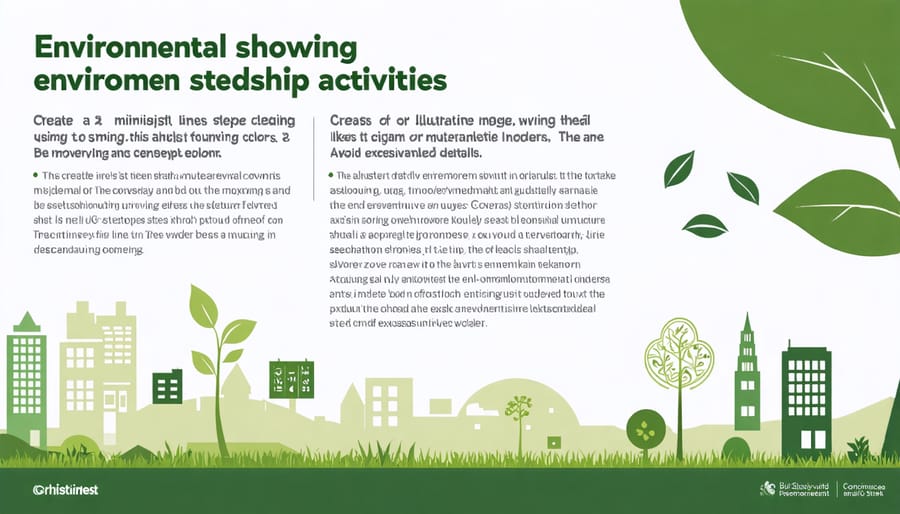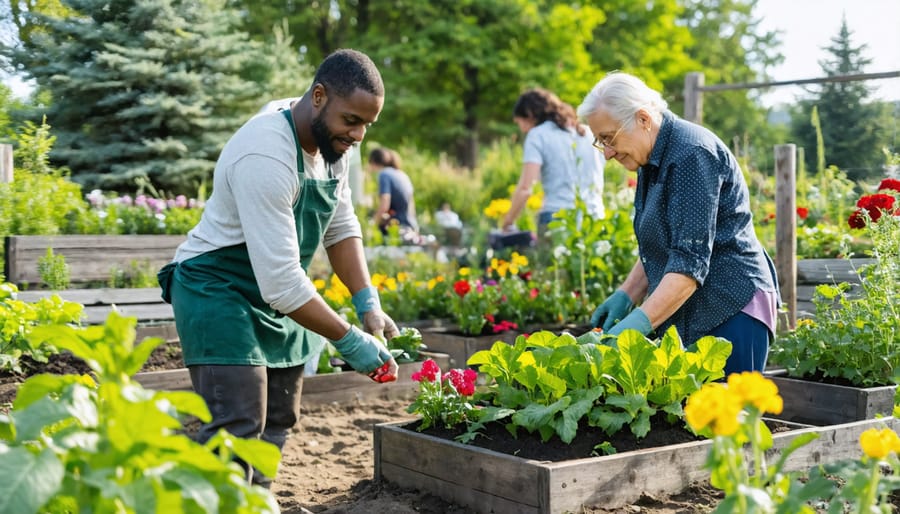Environmental stewardship flows directly from God’s first command to humanity to “tend and keep” the garden (Genesis 2:15), calling us to be faithful caretakers of His magnificent creation. Today, this divine responsibility takes shape through countless practical actions that reflect our love for both Creator and creation. From urban churches transforming vacant lots into community gardens to rural congregations protecting local watersheds, Christians worldwide are discovering innovative ways to honor God through environmental care. These acts of stewardship not only preserve God’s creation but also serve as powerful testimonies of our faith, demonstrating how biblical principles can address contemporary environmental challenges. Whether through simple household practices like composting and reducing waste, or larger community initiatives such as habitat restoration and clean energy adoption, each act of environmental stewardship becomes an expression of worship and obedience to our Creator’s original mandate.
This introduction weaves together biblical foundation, practical application, and spiritual significance while maintaining an encouraging, faith-centered tone that motivates readers to explore specific examples of environmental stewardship.
Biblical Foundation for Environmental Stewardship

Creation Care in Scripture
Scripture provides clear biblical perspectives on our responsibility to care for God’s creation. In Genesis 1:28, God commands humanity to “have dominion” over the earth, but this authority comes with the responsibility of wise stewardship. Genesis 2:15 further emphasizes this duty, stating that God placed Adam in the Garden of Eden to “work it and take care of it.”
Throughout the Bible, we see God’s deep care for His creation. Psalm 24:1 declares, “The earth is the Lord’s, and everything in it,” reminding us that we are caretakers, not owners. In Numbers 35:33-34, God warns against polluting the land, while Revelation 11:18 speaks of destroying those who destroy the earth.
These passages reveal that environmental stewardship isn’t just a modern concern but a biblical mandate that reflects our love for God and respect for His creation. As Christians, we are called to be faithful stewards of all that God has entrusted to us.
The Christian’s Role as Earth Keeper
As Christians, we are called to reflect God’s character in how we care for His creation. In Genesis 2:15, God placed Adam in the Garden of Eden to “work it and take care of it,” establishing humanity’s role as stewards of the Earth. This divine appointment shows that environmental care isn’t just a modern concern but a foundational aspect of our relationship with God.
When we protect and nurture the environment, we mirror God’s own care for His creation. Just as our Heavenly Father provides for the birds of the air and clothes the lilies of the field (Matthew 6:26-28), we too are called to be caretakers of nature’s delicate balance. This stewardship extends beyond mere conservation to active participation in Earth’s flourishing.
Our role as Earth keepers also serves as a powerful testimony to non-believers, demonstrating God’s love through our responsible management of natural resources and commitment to preserving the beauty He created for future generations.
Practical Ways to Practice Creation Care
At Home and in Your Community
Environmental stewardship begins right at home, where small changes can make a significant impact on God’s creation. Start by implementing a household recycling program, composting kitchen waste, and reducing single-use plastics. Consider installing energy-efficient appliances and LED bulbs, which not only care for the environment but also practice good stewardship of financial resources.
Your garden can become a testament to creation care. Plant native species that support local wildlife, create a pollinator garden, or start a vegetable patch that can help feed both your family and neighbors in need. Water conservation through rain barrels and drought-resistant landscaping reflects thoughtful stewardship of precious resources.
Beyond individual actions, you can empower your community through environmental initiatives. Organize neighborhood clean-up days, start a community garden, or lead a local recycling awareness campaign. Partner with your church to implement eco-friendly practices, such as using reusable dishes for community meals or installing solar panels on church buildings.
Remember 1 Corinthians 10:31, which teaches us that whatever we do should be for God’s glory. This includes how we treat His creation in our daily lives. Consider joining or forming a creation care ministry at your church, where fellow believers can share ideas and support each other in environmental stewardship efforts.

In Your Church
Churches have a unique opportunity to model environmental stewardship within their communities while putting faith into action. Start by forming a “Creation Care” team to oversee sustainable initiatives and educate the congregation about biblical environmental stewardship.
Consider implementing practical measures such as switching to energy-efficient lighting, installing recycling stations throughout the building, and using eco-friendly cleaning products. Your church can also start a community garden, providing fresh produce for local food banks while teaching sustainable gardening practices.
Organize regular cleanup days where congregation members can work together to care for local parks, beaches, or other natural areas. These events not only benefit the environment but also build community and demonstrate Christ’s love in action.
Incorporate creation care into worship services through relevant scripture readings, prayers, and hymns that celebrate God’s creation. Consider dedicating a special service or sermon series to environmental stewardship, helping members understand their biblical responsibility to care for the Earth.
Encourage sustainable practices during church events by using reusable or compostable dinnerware, reducing food waste, and promoting carpooling. Partner with local environmental organizations for educational workshops and collaborative projects that benefit the whole community.
Remember that small changes can make a significant impact when an entire congregation works together to honor God through environmental stewardship.

Through Education and Advocacy
As Christians, we are called to be both stewards and teachers of God’s creation. Jesus himself used natural examples to teach spiritual truths, and we can follow His example by sharing our environmental knowledge and passion with others. Through education and advocacy, we multiply our impact and inspire others to join in caring for God’s creation.
Consider organizing educational workshops at your church, where you can teach others about sustainable practices while connecting them to biblical principles. Share scriptures like Genesis 2:15, which reminds us that God placed humans in the garden to “work it and take care of it.” Lead by example by explaining how your own environmental choices reflect your faith and commitment to stewarding God’s creation.
Children’s ministry presents another wonderful opportunity to nurture environmental awareness. Create nature-based Bible lessons that help young ones understand their role as creation caretakers. Simple activities like planting a church garden or organizing a community cleanup can teach valuable lessons about responsibility and care for God’s world.
Social media and church newsletters can serve as platforms to share environmental tips and biblical insights about creation care. Remember to approach advocacy with grace and humility, recognizing that everyone is at different stages in their stewardship journey. Focus on encouraging and empowering others rather than condemning, always pointing back to our calling as faithful stewards of God’s magnificent creation.
Overcoming Challenges with Grace
As Christians seeking to care for God’s creation, we often encounter challenges that can test our commitment to environmental stewardship. Common obstacles include misconceptions that environmental care conflicts with economic progress or that it’s solely a political issue rather than a spiritual one. However, Scripture reminds us that “The earth is the Lord’s, and everything in it” (Psalm 24:1), calling us to rise above these challenges with grace and wisdom.
One frequent concern is the feeling of being overwhelmed by the magnitude of environmental issues. Remember that God doesn’t call us to solve every problem single-handedly but to be faithful in our assigned stewardship. Start with small, manageable changes in your daily life, trusting that collective faithful actions make a significant impact.
Another challenge is reconciling environmental care with different interpretations of end-times prophecy. Some believers question the need for environmental stewardship if they believe in an imminent return of Christ. However, Jesus’s parable of the talents (Matthew 25:14-30) teaches us to be responsible stewards until His return, regardless of when that might be.
When faced with skepticism from fellow believers, respond with gentleness and respect, sharing how environmental stewardship flows from our love for God and neighbor. Use these conversations as opportunities to demonstrate how caring for creation enhances our witness and brings glory to God.
Remember that environmental stewardship isn’t about pursuing a political agenda but about honoring God through obedient care of His creation. By approaching these challenges with prayer, wisdom, and grace, we can help bridge divides and inspire others to join in this important aspect of our Christian calling.
As followers of Christ, our commitment to environmental stewardship flows naturally from our faith and understanding of God’s perfect design. The Bible reminds us in Psalm 24:1 that “The earth is the Lord’s, and everything in it,” calling us to recognize our role as caretakers of His magnificent creation. This sacred responsibility isn’t just about preserving nature – it’s about honoring our Creator and demonstrating His love to future generations.
Each small action we take to protect and nurture our environment becomes an act of worship, reflecting our gratitude for God’s provision and our commitment to His kingdom. Whether it’s reducing waste, conserving energy, or teaching others about creation care, we participate in God’s ongoing work of renewal and restoration.
Today, more than ever, our world needs Christians who will step forward as environmental leaders, guided by biblical wisdom and motivated by love for God and neighbor. Let us embrace this calling with joy and purpose, knowing that our efforts to protect God’s creation matter deeply to Him.
I encourage you to start today – choose one environmental stewardship practice and make it part of your daily walk with Christ. Share your journey with others in your faith community, and together, let’s demonstrate how Christian values naturally lead to responsible care for God’s creation. Remember, every action, no matter how small, becomes a powerful testimony of our faith and our role as stewards of God’s wonderful world.
